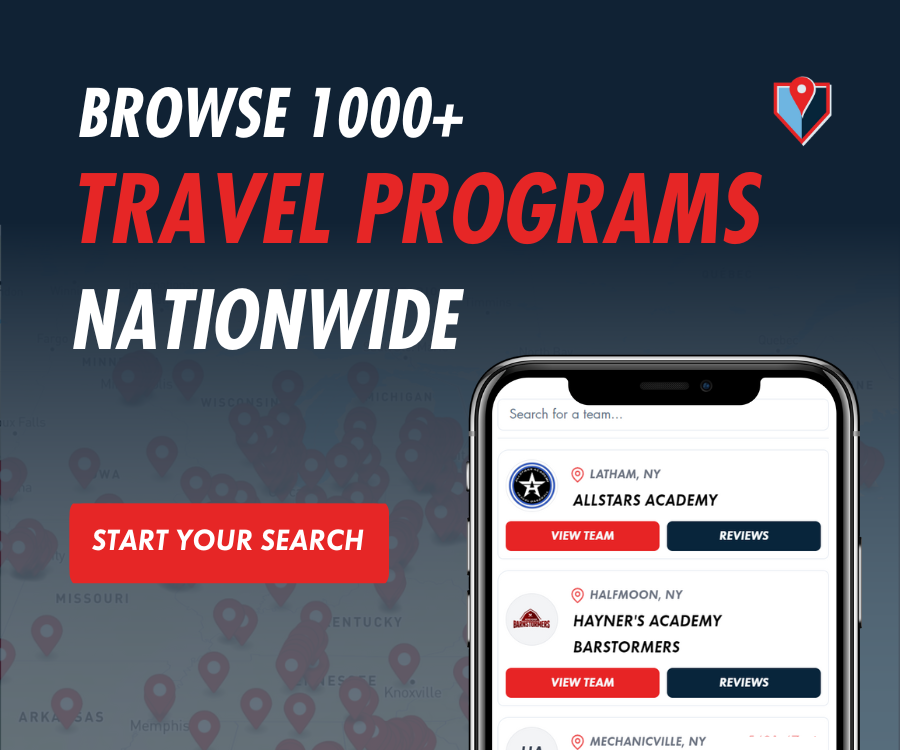How to Get Recruited to Play College Baseball
Written by Zach Kerr
Updated March 25th, 2025
Earning a baseball scholarship at the collegiate level requires skill, dedication, and strategic maneuvering through the recruitment process. This guide is designed to help you navigate this journey, with practical, no-nonsense advice, focused on the steps needed to optimize your chances of recruitment.
Create A List of Target Schools
Creating a list of target schools is a crucial first step in the college baseball recruitment process. Your list should include institutions that meet your academic and athletic needs and align with your career goals.
- Academic Fit: Your education should be a priority. Identify colleges that offer strong programs in your area of academic interest. Check their admission requirements, average GPA, and test scores to ensure you have a good chance of acceptance.
- Athletic Fit: Consider your athletic skills realistically. Your skills should align with the level of play at the colleges you target. Remember, each division (D1, D2, D3) has different levels of competitiveness.
- Location: Think about your preference for location. Are you comfortable being far from home, or do you prefer nearby colleges? Do you want to be in a city, suburban, or rural setting?
- Size of School: Colleges vary significantly in size. Some student-athletes prefer a large university with a vibrant campus life, while others might thrive in a smaller college environment.
- Financial Considerations: Consider the financial aspects. What are the tuition fees and living expenses? What scholarship opportunities are available?
Helpful Links for Creating Your List
- Best D1 Baseball Schools & Conferences
- Small D1 Baseball Colleges & Conferences
- Best Mid Major D1 Baseball Schools & Conferences
- D1 Baseball Programs in New England
- Best Academic D1 Baseball Schools
- Best D3 Baseball Schools
- Best D3 College Baseball Fields & Facilities
Build Relationships with Coaches
Creating relationships with college coaches is the cornerstone of your recruiting journey. Coaches are key decision-makers in scholarship allocation, and they prioritize players they know and trust. Take the initiative to:
- Message target schools: Create a list of target schools that fit your athletic ability and academic profile. Research each school’s baseball program, its history, and coaching staff.
- Communicate on time: Players are allowed to communicate directly with college coaches on August 1st of their incoming junior year.
- Introduce yourself: Make an initial introduction via email, explaining why you’re interested in their program. Keep it concise and professional.
- Maintain contact: Send updates every few months, highlighting improvements in your athletic or academic performance.
25 Questions to Ask College Baseball Coaches Before Committing
Play on Connected Travel Teams
Travel ball provides opportunities for regular competitive play. Elite organizations with strong networks make them more appealing because college coaches scout from these teams regularly.
- Join reputable teams: A team with a strong reputation or good connections in the baseball community can increase your visibility.
Attend Direct Prospect Camps
Prospect camps are a perfect place to get directly noticed by the college coaching staff. While the significance of large events like the I-95 showcase can be subjective, attending a prospect camp guarantees you’ll be seen by the coaching staff of the school hosting the event.
- Choose wisely: Attend camps at schools you’re genuinely interested in. Be strategic and consider your athletic and academic fit.
- Prepare well: These camps are not just for instruction, they’re a chance for you to show off your skills. Make sure you’re in top shape.
- Follow up: After the camp, send a follow-up email to the coaches, thanking them for the opportunity and reiterating your interest in their program.
Attending Showcases and Tournaments
Showcases and tournaments provide vital opportunities to demonstrate your skills in front of college coaches. However, it’s essential to be strategic and selective about the events you choose to attend. While it might be tempting to participate in every event, focus on attending high-quality showcases and tournaments that draw coaches from your target schools.
Prospect camps organized by colleges, often provide the most value. Overextending yourself by attending too many can lead to fatigue and subpar performances, so choose wisely.
Helpful Links for Showcases & Tournaments
- Players Guide to Perfect Game Showcases
- How to Get Invited to a Perfect Game Showcase
- Is the I-95 Baseball Showcase Worth It?
- Guide to Perfect Game Tournaments
- Perfect Game vs PBR: Players Guide
Perform Well In School
College coaches want athletes who will thrive in the classroom as well as on the field. Academic scholarships can supplement athletic ones, making you a more appealing recruit.
- Maintain good grades: A strong GPA is crucial. It opens up more opportunities and gives coaches confidence in your commitment.
- Do well in standardized tests: Good scores in the SAT or ACT are often mandatory. Start preparing early, and consider a prep course if necessary.
Get Better Every Day
Baseball is a sport where even small skill improvements can significantly impact your performance. Demonstrating a consistent commitment to improvement and a strong work ethic can set you apart.
- Practice regularly: This sounds cliché but is vital. Regular practice, both team-based and individual, is key to improvement.
- Seek professional training: If possible, work with a professional trainer or attend skills clinics to help enhance your skills.
Be Persistent
Recruiting is often a long process. It requires continued effort and a proactive approach.
- Regular follow-ups: Regularly following up with coaches shows your genuine interest.
- Attend showcase events: Regular participation in showcase events keeps you on the radar of recruiting coaches.
Leverage Social Media
In this digital age, having a positive social media presence can help. A good tweet can catch a coach’s eye, but remember, a bad post can also leave a negative impression.
- Maintain a professional profile: Keep your profiles clean and respectable. Post about your athletic achievements, upcoming games, or team activities.
- Highlight your skills: Short clips from your games or practice sessions, showing off specific skills can be very effective.
Highlight Video
A highlight video can give coaches an easy way to evaluate your skills, especially if they can’t watch you play in person.
- Keep it short: A 3-5 minute video is usually enough. Coaches are busy and may not watch beyond the first few minutes.
- Focus on skills: Show variety – hitting, fielding, throwing, or any position-specific skills. Include game footage, not just practice.
NCSA Links
Join the club!
Sign up for our newsletter for more articles like this and features updates from our team!


Ready to get started?

